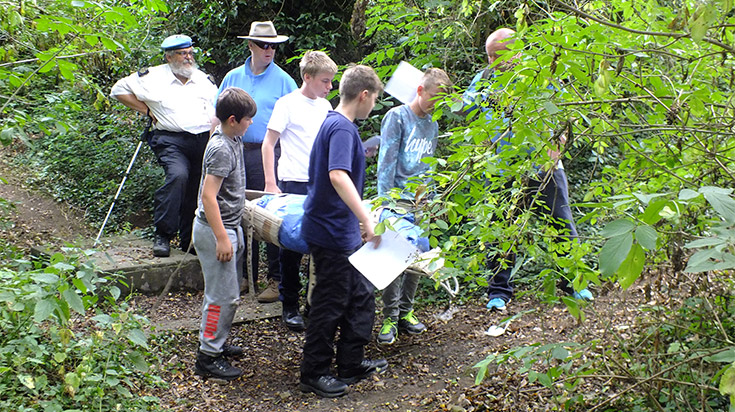A new approach to emergency support
The Joint Civil Aid Corps is a voluntary emergency support organisation looking to become a modern day Civil Defence Corps, explains Colin Harmsworth.

Working with cadets
As an ex-Army NCO, the author understands a certain reticence from the professional services, both military and civilian, when faced with the concept outlined within this article. How can a bunch of volunteers possibly support the professionals?
But, on the other hand, how can the professionals possibly sustain what is expected of them in light of constant change and budget cuts?
As society continues to move forward and change, so does the risk of disasters or terrorist events increase, so how will communities cope? The armed forces are already operationally committed and emergency services are seeing higher priorities take precedence against a background of diminishing resources. The voluntary sector needs to be ready to step in to relieve the pressure; volunteers need the professionals to help them prepare so they will have the confidence they can assist when required.
The Joint Civil Aid Corps (JCAC) is the management and administrative body responsible for both the Civil Aid Volunteer Corps (CAVC: for adults 18+ with no defined retirement age) and the Civil Cadet Corps (CCC: 12 to 18 years old). Although it has a small Cadet unit, it is now focussing solely on building adult units across the UK. Cadet stations will be introduced once the adult units are established in their areas and can support development of a of a youth unit.
The aim is to provide a structured body of disciplined volunteers capable of working independently, but in support of the professionals and other voluntary specialist organisations.
The JCAC is developing units with 23 trades from support elements – such as logistics, mechanical support, through to engineers and communications – to operational roles such as guardians (security), USAR, and medical support.
A CAVC Station will be made up of five divisions: Operational support and specialists; communications and intelligence; guardians; search and rescue; and first aid and welfare. The divisions are for training purposes with the expectation that unless the station is on an independent exercise or operation where all members are involved, operational units will be made up of composite ‘Community Emergency Response Teams’. This structure is loosely based on the original UK Civil Defence Corps.
Before specialising, volunteers will go through two levels of training. Stage one – basic training – is an introduction to the Corps, some base line skills, and a starter in discipline and team building. Stage two – search and rescue basics (SaRBs) – is an introduction to skills such as incident management, first aid and communication skills.
The reason behind the two stages is to ensure that all volunteers have a full awareness of what is required in a situation and be able to assist within their community. Although the JCAC has some expertise on board, specialist training will be developed as suitable people are recruited with the appropriate credentials or experience.
As a charity, the JCAC’s funding comes from subscriptions, grants and donations; it is also looking into creative and commercial ideas for self-funding. Currently, all members are volunteers; government funding would be extremely helpful.
As with all voluntary organisations that aim to provide support during emergencies, it is the ability of members to attend when needed that is going to be the problem. It will take an Act of Parliament to safeguard volunteers, enabling them to be called when needed from work without risk to their jobs or discrimination within the work place.
The responses would be to substantial events, such as mass casualty disasters, factory fires, and large-scale flooding incidents, where the professionals will need realistic support to take the pressure off them to give them the room to manoeuvre. To achieve such legislation the professional will have to stand side by side with the voluntary organisations. The JCAC certainly does not want to take jobs away from the professionals, nor does it want to be in competition with other voluntary organisations.
This is not going to be a quick solution, but the members of the JCAC are in it for the long haul, confident that they will make this work for the benefit of communities and in support of the professional services.
Colin Harmsworth is Chief Officer, Joint Civil Aid Corps; more info
Colin Harmsworth, 23/12/2015